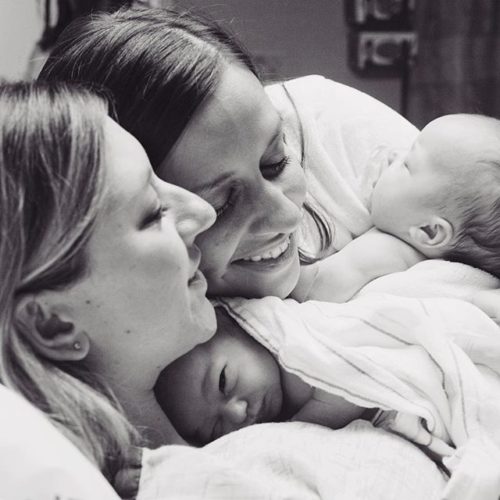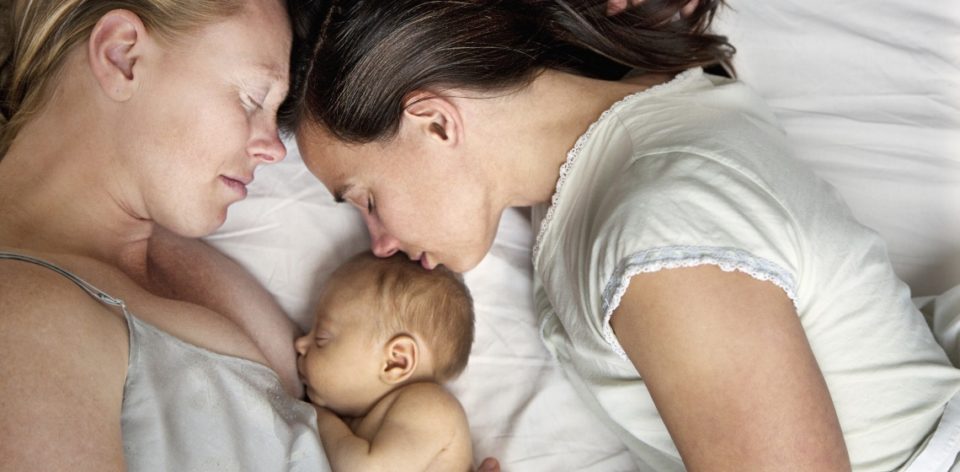Having children is wonderful. It’s all the same whether the new life comes to us by adoption, by natural birth or by artificial insemination. The process that leads to finally holding that little bundle of joy in our arms is varied, exciting and sometimes painful, full of moments of happiness and letdowns. We will go through anything just to get a child. This was what I got from all three women I interviewed.
I talked to three mothers, Nóri, Kata and Bea, about the ways they got ready for artificial insemination, how they felt about the attempts and the mental journey they went through.
‘But where’s the father?’
‘We chose an anonymous donor, because we didn’t know any man who would have been fit to donate (or be a dad), and besides, this is the only legally clear way’ Kata states right away, adding that because of this, they were more worried about what sort of genes the child would inherit.
If you research the rights of the biological father, you’ll find that he can always request custody, in Hungary he can not disclaim these rights once and for all. This might cause problems, since disagreements over raising the child can lead to arguments or even serious legal battles. It’s not surprising that a lot of women are discouraged and choose an anonymous donor instead.
Dr Rathmanner informs us that Tinyfeet Clinic also offers the option of choosing an anonymous (or rather semi-anonymous, as described in a previous article) donor. Lesbians often go with this choice, especially the ones coming from such chaotic legal backgrounds as the Hungarian couples. Donors can be filtered by hair colour, eye colour, height, weight, age, hobbies, religion or nationality - just to mention a few aspects.
Bea and her partner originally intended to ask a close friend for help, who would have become the biological father and also wanted to take an active part in the child’s life. Since she couldn’t become pregnant even after several attempts, the couple eventually got a child via IVF, from an anonymous donor. ‘We only have some basic information about the donor, such as his eye and hair colour and religion’ - adoption was not an option for the couple since Bea wanted to give birth to their child. ‘We took great care to provide our child with a father figure to look up to’ - so the close friend who was meant to be the biological father now takes an active part in the family’s life.
When the donor doesn’t take part in the process of the pregnancy and raising the child, questions like ‘but where’s the dad?’ become unavoidable. In hindsight Nóri and her partner find it funny how confused the registrar was when they combined their names and had their child’s documentation sorted out, but right there on the spot these things can be difficult to deal with. With two mums you can run into weird situations at the GP, the nurse, the obstetrician (questions that would never arise for straight couples) - just to mention a few. Since in these situations trying to keep a secret is not a good idea it’s best to just be upfront and honest.

Supportive environment
‘During the pregnancy you must go to a lot of checkups, which don’t always take place in a safe environment. It’s a great relief to have an accepting, trustworthy and professional ob-gyn, with whom I can openly and honestly discuss all the details. This is also a situation where lying is a bad idea’ - Nóri told us. A visit to the doctor already puts us in a vulnerable position, not to mention when it’s all about the health of your child, who you want to protect at all cost.
‘I’ve been to several gynecologists, we’ve been trying to get pregnant for years. Now I know that picking the right doctor is incredibly important. We have to be sure that we can trust the doctor and that they’d do anything to help us get a baby. It’s also useful to find a support group on social media where this information can be shared’ - Bea adds that they received and keep receiving a lot of useful tips in such groups.
As a doctor, Dr Rathmanner confirms this: in such a situation, that’s both intimate and extremely tense, trust and honesty between the patient and the doctor is key. As he said in our last article: ‘We are not treating patients, we are helping women who want children. Whether these women are in a heterosexual or a lesbian relationship is all the same for us. What we are working for with our whole hearts is that anyone who wants a child to be able to bring a new life to this world.’
Prepare for what you cannot prepare for
‘No matter what, getting pregnant is a gamble. It either works out or it doesn’t, and there’s no 100% effective method that guarantees a pregnancy. When you decide to start the process it comes with a lot of waiting, planning, and you’ll need a lot of patience to survive this time in relative peace and remain calm. This period will also put a strain on your relationship, because a score of spoken and unspoken expectations will emerge about how to best handle things, so they proceed as quickly and easily as possible’ - Nóri sums up the initial hardships.
For Kata, the 5th IVF attempt was successful. The period of 2-3 years while she kept trying was trying both in a mental and physical sense, but they worked together as a team, and in hindsight all she has to say about the trials they faced was ‘it’s fine, not such a great sacrifice for a child’.
‘How did you feel about the unsuccessful attempts?’ This is the most painful question, because it’s indescribably heartbreaking when, despite all hope, menstruation returns anyway - it failed, you must try again.
‘Countless early pregnancies end in miscarriage, sometimes the woman won’t even find out she was pregnant. Of course this is not the case in a lesbian relationship - every unsuccessful attempt registers as a deep loss if the test is positive and yet in a few days you start bleeding again, that’s terribly painful.’ - Nóri tells us. For heterosexual couples concieving a child is as simple as coupling, but for lesbians it comes with a lot of careful planning, not to mention the time, energy and money that has to be invested. A miscarriage is always disappointing. Besides sadness and desperation it can also cause anger and a feeling of hopelessness.
Kata’s ‘survival trick’ was trying to accept the whole thing as a process that will include failed attempts too. It must be done until it finally succeeds, because every failure brings us closer to the goal.

‘There’s no way to guarantee certain success, but there are many ways to improve the chances of getting pregnant while taking the patient’s circumstances, condition and wishes into account.’ says Dr Rathmanner, who also shared some relevant statistics in our last article.
And finally a word of advice from Nóri:
‘A lot of questions might arise during the pregnancy, fuelled by your fears. The most you can do about it is to discuss them with each other and/or with your friends, family or even a helpful professional (a psychiatrist, a therapist or mental hygiene professional), this will tame these - often irrational, but sometimes very real - fears, or maybe even chase them away completely.’
If you would like to contact the experts of Tiny Feet Clinic, you can call their hotline: +43-2622-64493 or write them an email to wn@tinyfeet.at.

